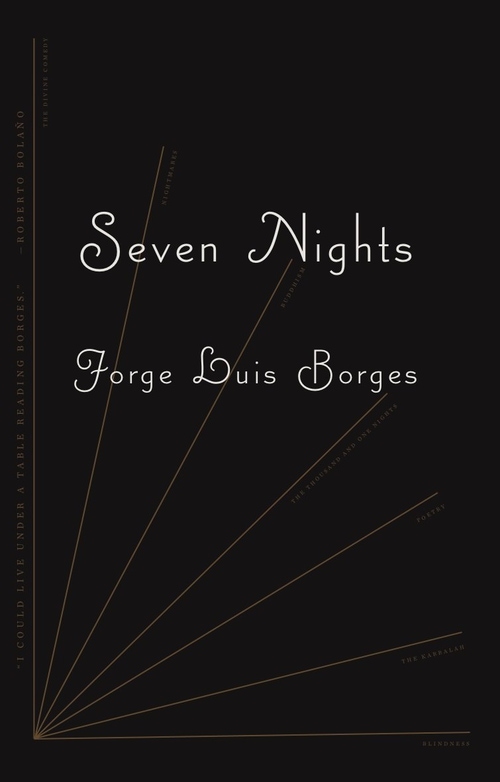
“We see how marvelous the world is and how interconnected things are.” – Jorge Luis Borges, in the 1977 Buenos Aires lecture “The Thousand and One Nights”; published in Seven Nights, 1984, New Directions Books; translated by Eliot Weinberger.
August 24 was the 122nd anniversary of the birth of the Argentine writer Jorge Luis Borges, and June 14 was the 35th anniversary of his death. As with last year and many previous years, I’ve taken a look back at the past year, to study how the Borges influence continues to grow, long after his death.
I’m also paying tribute to American University Professor Emeritus Charles R. Larson, who died at 83 on May 22, and in whose class I first discovered Borges in the early 1970s. I had no contact with Dr. Larson for nearly 40 years until I contacted him by email in 2009 to let him know that I had blogged about him in 2009, and that I had recently published my first book. He sent me a gracious email in return, and we had another brief exchange last year.
Dr. Larson was a pioneer in the academic study and publishing of African literature. In his Washington Post obituary, Emily Langer writes of his joining the AU faculty in 1970, “At a time when the literary canon consisted almost entirely of works by British and American authors, he helped secure a place in American academia for writers including Achebe and Wole Soyinka, the Nigerian playwright who in 1986 received the Nobel Prize in literature.” He was the editor of such books as Under African Skies: Modern African Stories, and the author of, among others, The Emergence of African Fiction, published not long after my class with him.
He was a regular contributor to the website Counterpunch, and a collection of his papers is at the Harry Ransom Center at the University of Texas Austin; coincidentally also the home of valuable Borges documents. However, I believe that Borges would not consider this to be a coincidence. In the above-mentioned Seven Nights, on page 8 in the lecture on The Divine Comedy: “Chance—except that there is no chance; what we call chance is our ignorance of the complex machinery of causality…”
Another recent Borges-related death: In my post last year, I pointed out that Borges was featured prominently in the 2019 essay “Can Libraries Save America?” by Vartan Gregorian, president of the Carnegie Corporation of America, and also president of the New York Public Library from 1981-1989. Gregorian died at 87 on April 15. (Borges, who wrote about libraries often, was director of the National Library of Argentina from 1955-1973.)
During the past 12 months, there has been considerable Borges-related activity both in print and online. The virtual Festival Borges was held on August 23-28. One of the participants was Daniel Balderston, director of The Borges Center at the University of Pittsburgh, a professor at Pitt, author of How Borges Wrote, and editor of Variaciones Borges. From May 14-June 30, the Institute of Contemporary Art Baltimore presented an exhibition by TLaloC, aka Eduardo Corral, Orbis Tertius -Hlaer-to-Jangr-. According to the institution’s website: “The exhibition borrows from the short story “Tlon, Uqbar, Orbis Tertius,” by the Argentine writer Jorge Luis Borges, creating a visual allegory that seeks to show the exact point where his world and TLaloC’s converge.”
This year also marked the release of a Borges-inspired film, Aleph, by Iva Radivojević, as noted in the filmmaker interview “Everything You’re Feeling or Seeing in the Moment Comes Into the Story”: Director Iva Radivojevic on Her Borgesian Tale of Wanderlust and Connection, Aleph.”
On August 23, The Los Angeles Review of Books recently published “I’ll Be in Another World”: A Rediscovered Interview with Jorge Luis Borges.” TheNewYorker.com published a short humor piece by Nina Sharma, “Jorge Luis Borges and Nancy Meyers Pitch a Movie (Because, Admit it, You’ve Watched Everything Else),” on May 11.
There is now a second edition of Borges y La Cábala. La búsqueda del verbo by University of Maryland professor and longtime Borges scholar Saúl Sosnowski, whom I have written about often. Last December 1, he moderated the virtual discussion “Jorge Luis Borges: An Argentine for the Ages,” for the Argentina Embassy in United States; with Borges’ widow, María Kodama; and Ambassador Jorge Argüello.
After my 2020 blog post about Borges, I connected virtually with Dermot O’Shea, co-founder of the Dublin, Ireland based digital studio WONDR, whose name is inspired by “Undr,” a short story in Borges’ collection The Book of Sand. They have created a very cool web page that explains the deep inspirations and associations WONDR has with Borges, and with the latter’s connections to Ireland.
Finally, I continue to believe that the always-unfolding influence and impact of Borges’ work should be an inspiration to knowledge workers, and everyone else in the creative economy, as I pointed out in two earlier posts, “6 Success Strategies of Jorge Luis Borges,” (2017), and “7 Self-Management Secrets of Jorge Luis Borges,” (2013).
As we turn our thoughts to not only Borges, but Dr. Larson and Dr. Gregorian, I repeat what I wrote in ‘6 Success Strategies’: “No one is immortal, but creating work that lives on beyond one’s death assures that future generations will benefit from what we create.”
